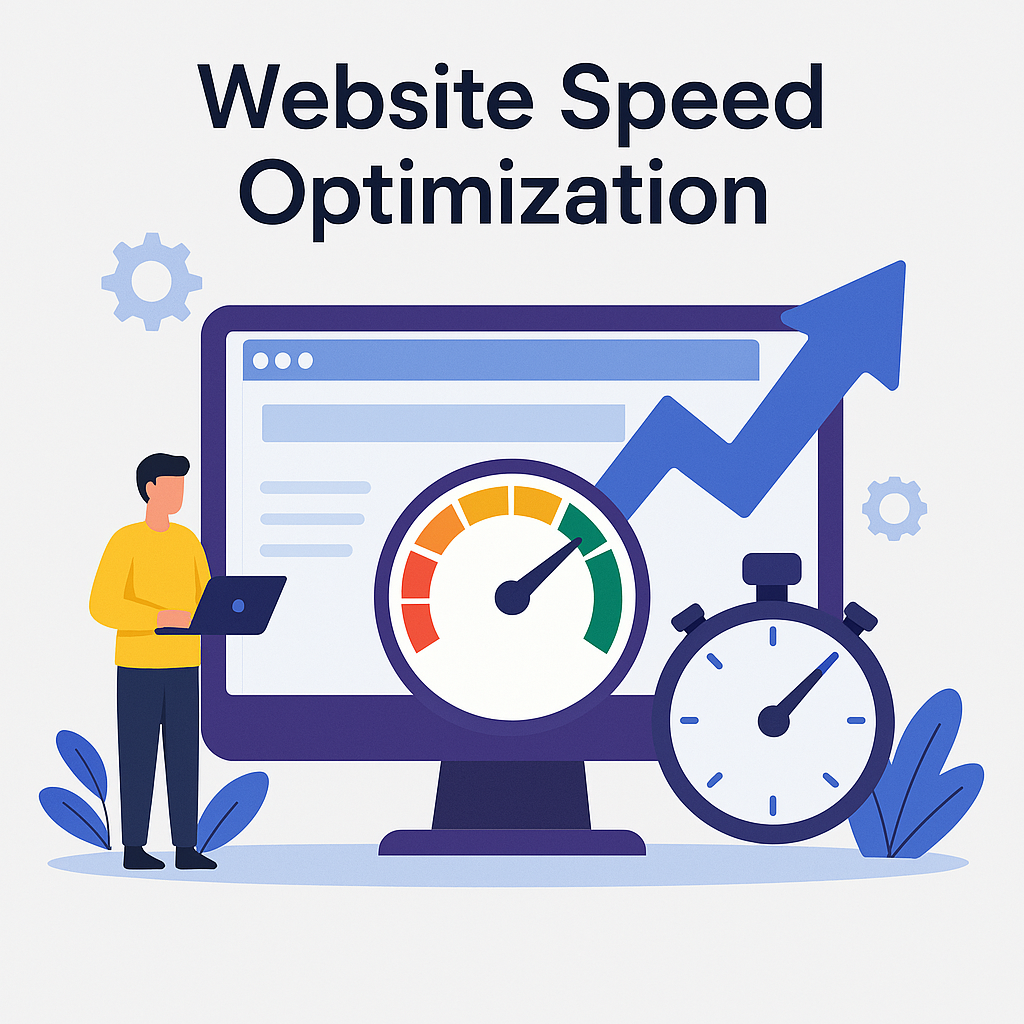Introduction
Website speed optimization isn’t just a tech tweak—it’s a game-changer for your online success. A slow website kills conversions, frustrates users, and tanks your SEO. Research shows a one-second delay in page load time can slash conversions by 7% and cut customer satisfaction by 16% (Portent). If your site lags, visitors bounce—and they rarely return.
Whether you run a small business, eCommerce store, or blog, these 7 website speed optimization tips will make your site faster, improve user experience, and boost your bottom line in 2025. Let’s get started.
Why Website Speed Optimization Matters
Speed is everything online. Google’s data reveals most users abandon a site that doesn’t load within 3 seconds. That’s a tight window—and missing it hurts more than just user patience. Website speed optimization impacts:
- SEO rankings (Google prioritizes fast sites)
- Ad performance (slow sites hurt ad revenue)
- Mobile usability (crucial for over 50% of traffic)
- User trust and engagement
A slow site doesn’t just lose visitors—it loses money. Optimizing speed is a must, not a maybe.
How to Check Your Website Speed
Before diving into website speed optimization, measure your starting point. Use these free tools:
- Google PageSpeed Insights – Scores mobile and desktop performance
- GTmetrix – Visual breakdown of load issues
- Pingdom Tools – Detailed waterfall reports
These pinpoint slow elements like images, scripts, or hosting delays.
7 Website Speed Optimization Tips That Work
1. Compress and Resize All Images
Unoptimized images are a top speed killer. Website speed optimization starts here.
Fix:
- Compress with TinyPNG or ImageOptim
- Use WordPress plugins like ShortPixel or Smush
- Resize images to their display size (e.g., don’t load 2000px for a 300px slot)
2. Pick a Fast, Lightweight Theme
Heavy themes with sliders or bloated code drag your site down.
Fix: Choose lightweight options like:
- Astra
- GeneratePress
- Hello Theme (with Elementor)
For custom speed-focused design, try Adwebify.
3. Enable Caching
Caching saves static site versions, speeding up repeat visits—a key website speed optimization trick.
Fix: Use:
- WP Rocket (premium)
- LiteSpeed Cache (free)
- W3 Total Cache (free)
4. Use a Content Delivery Network (CDN)
CDNs store your site on global servers, cutting load times worldwide.
Fix: Try:
- Cloudflare (free & paid)
- BunnyCDN
- StackPath
CDNs also boost security and uptime.
5. Minify and Combine Files
CSS, JavaScript, and HTML often carry extra bulk. Minifying them is a website speed optimization essential.
Fix: Use:
- Autoptimize (free plugin)
- WP Rocket (built-in minification)
- SiteGround Optimizer (if hosted there)
6. Cut HTTP Requests
More plugins, fonts, or scripts mean more requests—and slower speeds.
Fix:
- Keep plugins minimal
- Disable unused features
- Limit font variations
- Swap image icons for SVGs

7. Upgrade Your Hosting
Cheap shared hosting often sacrifices speed. Website speed optimization demands better.
Fix: Switch to:
- VPS hosting
- Cloud hosting
- Managed WordPress hosting
Check Adwebify Hosting for speed-optimized plans.
Why Website Speed Optimization Pays Off
These website speed optimization tips aren’t just technical fixes—they’re business boosters. Faster sites rank higher, retain users, and convert better. In 2025, with mobile traffic soaring and competition fierce, speed is your edge.
Test your progress with Google PageSpeed Insights. Want more strategies? Visit our blog.
Final Thoughts
Website speed optimization is non-negotiable in today’s fast-paced digital landscape. Slow load times don’t just bleed traffic and revenue—they erode trust, frustrate potential customers, and signal to search engines that your site isn’t worth ranking. Fortunately, these 7 powerful website speed optimization tips can turn the tide. From compressing images to upgrading your hosting, each step builds a faster, more effective site that keeps users engaged and converts clicks into cash.
But speed isn’t a one-and-done fix—it’s an ongoing commitment. As your site grows with more content, products, or features, unchecked additions can creep back in and slow things down. Regularly audit your performance with tools like GTmetrix or Pingdom to stay ahead. Pair that with a proactive approach—say, scheduling monthly reviews of plugins, images, and code—and you’ll maintain that lightning-fast edge.
Why does this matter so much? Because in 2025, users expect instant results. A site that loads in under 2 seconds isn’t just a luxury—it’s the standard. Falling short means losing ground to competitors who’ve already mastered website speed optimization. Imagine an eCommerce store losing sales because a product page lags, or a blog missing readers because articles take too long to appear. Speed isn’t optional—it’s the foundation of a thriving online presence.
For small businesses especially, these website speed optimization tips are a lifeline. You might not have the budget for a massive overhaul, but incremental changes—like switching to a CDN or trimming HTTP requests—deliver outsized results without breaking the bank. And the payoff? Higher SEO rankings, happier visitors, and a conversion rate that climbs instead of crashes.
Ready to ditch slow speeds for good? Contact Adwebify for expert website speed optimization—fast, secure, and fully managed. Our team doesn’t just tweak your site; we rebuild its performance from the ground up, ensuring every page loads at peak efficiency. Don’t let sluggish load times hold you back—let’s make your website a speed machine that drives real growth.
